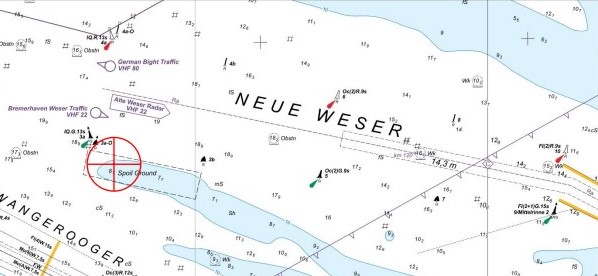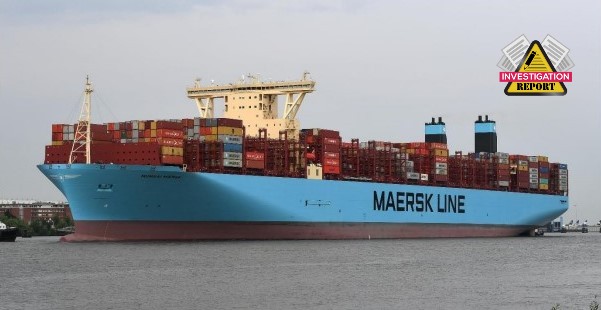The German Bureau of Maritime Casualty Investigation (BSU) published its interim accident report on the containership MUMBAI MAERSK, which ran aground while entering the Weser fairway, on 2 February 2022.
The incident
On 2 February 2022, the MUMBAI MAERSK, a so-called “Ultra-Large Container Ship“ (ULCS), was en route from Rotterdam (Netherlands) to Bremerhaven.
The ship had chosen the deep-water route as opposed to the coastal route for its approach. In the course of a turning manoeuvre just before entry into the narrow “Neue Weser” fairway, the ship ran aground on a dumping ground for dredging silt adjacent to the fairway.
During her approach to the narrow fairway section, the MUMBAI MAERSK received the information via UHF that her berth was still occupied, despite existing schedules, but would become free very soon.
With a draft of 12.80 m, the ship was tide-dependent. At first, Vessel Traffic Services granted permission for the ship, which was approaching at a speed of 6 – 7 knots, to cross into the next VTS district.
Shortly afterwards, however, it was denied entry into the narrow section of the fairway in which neither turning nor encounters between large ships would be possible without problems. The vessel, therefore, performed a turn before that point (approx. level with buoys 3b and 4b) and proceeded to sail in the opposite direction.
Less than half an hour later, the MUMBAI MAERSK was informed that she could now enter Bremerhaven after all. With the tide window threatening to close, the ship immediately turned back to its original course. The planned manoeuvre failed, however, and the MUMBAI MAERSK ran aground on a dumping ground for dredging silt just south of the fairway.

Due to the sudden “deceleration” of the foreship, which had run aground first, at a speed of almost 10 knots and during a port turn, the stern of the ship entered into a yawing motion.
The ship continued to pivot around a longitudinal axis on the grounded foreship. When the MUMBAI MAERSK finally stopped moving after about 20 minutes, it rotated by more than 180° from the direction in which it had run onto the dumping ground. When the grounding first happened at 23:06 hrs, it was immediately reported to Vessel Traffic Control.
The informed CCME assumed overall command of the salvage operations an hour later. A first attempt at towing the ship free at the next high tide failed and had to be aborted.
The Dutch salvage company SMIT Salvage, commissioned by the shipping company, prepared a salvage plan that was coordinated with the CCME. At the next high tide (in the night between 3 and 4 February) the next attempt was made at towing the vessel free.
Prior to this, the exact water depths around the MUMBAI MAERSK had been sounded and the ship lightened by 7.000 tons of ballast water. At 0114 hrs on 4 February 2022, the ship was reported to be afloat.
Before the MUMBAI MAERSK entered Bremerhaven under her own steam, she was towed into the German Bight to test her two main engines.
The diving inspection required for maintenance of class, including all class surveys, was conducted in the next scheduled port of call, Aarhus (Denmark), due to insufficient water depth in Bremerhaven and poor visibility conditions underwater.
For this purpose, provisional voyage permission was granted in Bremerhaven after a survey of all tanks by the classification society, Germany’s Ship Safety Division, and the vessel’s insurance company. The diving inspection revealed that the accident had only resulted in paint abrasion, and that the ship had not sustained any further damage. Class was therefore reissued.
The investigations by the BSU, dealing with Weser approach coordination, the management of dredging silt and dredging operations in general, as well as an extensive analysis of the navigational manoeuvres before the accident, have been concluded. The BSU is currently in the process of preparing the investigation report
BSU explained.


































































